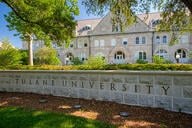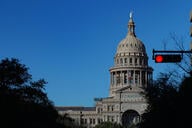You have /5 articles left.
Sign up for a free account or log in.
Northeastern Illinois University denied tenure to a linguistics professor on “glaringly insufficient” grounds, concludes an investigative report out today from the American Association of University Professors. Investigators also cite “an unfavorable climate for academic freedom” on that campus.
According to the report, John Boyle, an assistant professor of linguistics, was caught in two separate but related political battles when he applied for tenure two years ago. In the first conflict, an intra-departmental divide between linguistics and teaching English as a second language (TESL) faculty that predated Boyle’s time at Northeastern Illinois boiled over during his probationary period. Ultimately, linguistics faculty moved out of the department, which also housed philosophy and anthropology faculty, and into the English department. Linguistics faculty felt that policies and procedures for the creation of a new TESL undergraduate degree, along with other changes to the curriculum and course catalogue, had not been followed, and that administrators were complicit.
At about the same time, the Faculty Senate took a vote of no confidence in the university president and provost. Their action prompted an eventual facultywide vote on President Sharon Hahs and Lawrence Frank, provost, with the same result.
Boyle and his supporters say that because three linguistics faculty members were in the Senate in 2010-11 and voted against the president and provost -- partly due to their concerns about the administration’s handling of the linguistics-TESL schism -- Hahs retaliated against Boyle by denying him tenure. Boyle, who was not part of the Senate but was present during the Senate vote, was the only applicant of 16 to be denied tenure the following year, in 2011-12. He previously had been recommended for tenure by the linguistics faculty, his department chair, the dean of the College of Arts and Sciences and, unanimously, by the University Personnel Committee.
AAUP also concludes that Boyle was punished for the linguistics faculty’s involvement in the vote. A linguistics colleague was the president of the Senate at the time, and three of four linguistics faculty members were voting members, of about 20 members total.
The report says that complaints originating from the TESL-linguistics divide provided Hahs ammunition with which to deny Boyle tenure. In one instance, the professor says that several TESL faculty members prompted a student to file a complaint against Boyle that he advised her to minor in linguistics because she would have to take extra courses to graduate if she minored in TESL.
Boyle says he told the student no such thing, and that the student was prompted by her clinical adviser to file the complaint against him four months after he talked with her about her minor choice – as he was up for tenure.
“I think the departmental issues were a huge factor in this,” he said. “I don’t know that the TESL faculty intended to get me fired, but I do think members of the faculty intended to stir up trouble between linguistics and TESL. There was a huge rivalry, more on their side than with us.” Boyle described TESL as "subset" of linguistics. It's seen by many as a practical branch of the more theoretical discipline.
The two groups found themselves in conflict over control of parts of the curriculum and over numbers of majors and minors. According to the report, one TESL professor in an email to administrators described the linguistics faculty as waging "an ongoing smear campaign" against TESL faculty by discrediting them with students and other colleagues and portraying themselves as "the only legitimate members of an elite club."
Hahs also asked Boyle to develop a plan to improve his advising, based on a set of emails he exchanged with another professor in the College of Education about his "advocacy' of the linguistics minor and course requirements for the state TESL endorsement for teaching. AAUP finds that the information he provided to that colleague was correct. Nevertheless, Boyle developed the plan. But he accidently sent it to an academic advising office, rather than the provost.
The investigating committee finds that Hahs’s justifications for vetoing faculty endorsements are insufficient and that those provided violate principles of academic freedom. In one cited reason, Hahs references “cooperation with colleagues and students.” The other cited reason is missing the deadline for the counseling plan (which Boyle forwarded to the provost upon hearing that it was missing from his file, to no avail). The AAUP rejects the notion that collegiality or similar concepts are a fourth, unofficial requisite for tenure, following teaching, scholarship and service. By all accounts, Boyle excelled at teaching and got many students involved in research on Native American languages.
Boyle called the report a “vindication” of sorts and said he hoped – despite recent events at Northeastern Illinois – to return to the faculty there. He is currently involved in several pro bono research efforts involving Native American tribes in Montana but wants to get back to teaching and full-time work, he said.
Loretta Capeheart, a professor of justice studies and president of the AAUP’s new Northeastern Illinois chapter, said she hoped the report would force administrative accountability for recent violations of academic freedom on that campus. Capeheart is involved in a longstanding legal battle against the university. She alleges she was denied a department leadership position for backing students who protested the Central Intelligence Agency and for publicly criticizing administrative spending.
Several of the TESL faculty members mentioned by name in the report did not immediately return requests for comment.
A spokeswoman from NEIU forwarded a memo Hahs sent to faculty on Monday about the report.
“The AAUP’s report criticizes the University for, among other things, refusing to be more forthcoming with confidential personnel information,” Hahs says, noting that the university has been consistently cooperative with the AAUP but protects personnel information from outside bodies, even under pressure.
The memo also contained as an attachment the university’s response to a draft of the report it received in October. “The university strongly disagrees with virtually every aspect of this draft, which is riddled with factual errors, misinterpretations of university policies and procedures, and unwarranted assumptions about the university’s governance structures and decision-making processes,” it says, accusing AAUP of not interviewing a cross-section of “knowledgeable individuals” at the university.
The university response says it is most troubled by AAUP's charge that it is not releasing confidential employee information about Boyle.
In its report, the AAUP notes that it is not concerned that Northeastern Illinois is withholding confidential information from the investigating committee, but rather from Boyle himself. Boyle agreed, saying he's still been given no clear reason why he was denied tenure.
Jordan Kurland, associate general secretary of the AAUP, said the body’s Committee A on Academic Freedom and Tenure will meet in the spring to discuss the case. The body also could recommend Northeastern Illinois for a censure vote at the next AAUP conference, in June.
Peter N. Kirstein, professor of history at St. Xavier University in Illinois, who led the state AAUP conference investigation into Boyle’s case ahead of the national investigation, said that Boyle’s case, coupled with Capeheart’s, cast a dubious light on Northeastern Illinois and said it wouldn’t be far-fetched for the university to be censured next year.
But that’s a worst-case scenario, said Rebecca J. Williams, professor of English at the University of Central Arkansas and chair of the investigating committee. Northeastern Illinois can act to head off such a possibility.
“First, ideally, of course we would like to see John Boyle restored to his position, with tenure,” she said. More broadly, Northeastern Illinois must honor the “primacy” of faculty recommendations for personnel and curricular decisions. That goes for the Board of Trustees, as well, which upheld Hahs's decision.





